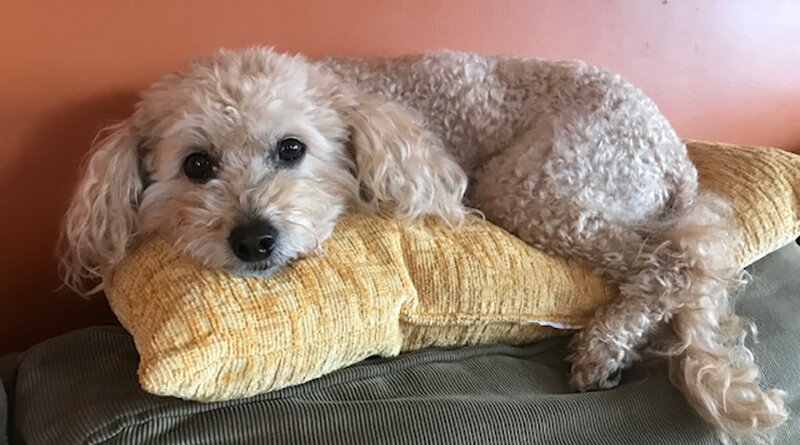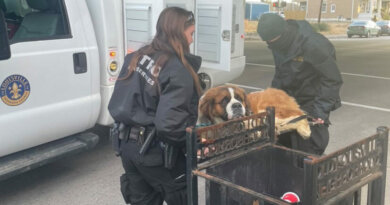Our Zelda | The Bark
She came home as ash. In a black tin etched with red roses. A lock of hair, a patch of fur. A paw print pressed in clay.
Here was our Zelda, parts packaged in a gift bag. It did not capture her smile, with the missing front teeth. Or the way she would bound across a room and push you over, Elaine Benes-style, all 12 pounds of her taking an in-place running start. It was a lovely sentiment but it lacked something essential—the story of her. The story of us.
***
Zelda was my post-divorce dog, my single-woman dog. She was on my bucket list, along with other things my ex wasn’t interested in, like owning a home. I bought a house and lived in it alone for four months before I brought her into it, fit in the palm of my hand. She screeched the whole ride, and then she threw up, and then she fell asleep. She would never like the car when it was moving, but she would always insist on going with me. A fan of the Fitzgeralds, I named her Zelda.
GET THE BARK IN YOUR INBOX!
Sign up for our newsletter and stay in the know.
There is something about the bond with an animal when it is just the two of you. There is more than companionship and a steady presence. I referred to her as my favorite friend because I have a human best friend, but let’s face it—she was my BFF, my roommate, my soulmate. She was my longest, strongest relationship. First face seen in the morning and last at night, door-greeter, therapist. If a restaurant wasn’t dog-friendly, I often didn’t go. If a road trip was worth making, she was by my side. If a nap was in order, she walked the length of my body to lie with her head on my shoulder.
We were a team for four years. I went back to school. I switched jobs (twice). A champagne-colored mini-Labradoodle and a 40-something finding herself. She was there, but more than there. She was my confidante. She witnessed my frustrations. She heard my jokes before anyone else. I like to think she was laughing inside.
Is it talking to yourself if your dog is listening? Is it sleeping alone if your dog is cuddled against your back? Is it cooking for one if your dog enjoys the meal, too? Perhaps we were co-dependent. I choose to think we kept each other afloat.
When I decided to become a foster parent, the agency asked me to write an essay about our family. The intent was to give the essay to a prospective foster child so that they would have a sense of you before moving in. The agency stressed that I should include Zelda; they acknowledged her role in my life. I included a photo with my essay—it was a holiday picture and we were dressed in matching red sweaters. I figured that whatever kid came to us might as well know up front what they were getting.
Enter Rose. She was just-turned-12, all elbows and colt legs. In foster care off and on her whole life and now here, with us. Zelda was skeptical—how long was this kid staying? There were outbursts, raised voices. This was a child with unregulated emotions, a child who had seen violence close-up. Zelda was skittish around Rose; she barked in a way that she never had before. She became protective of me.
And then.
Something clicked, something shifted. I would find Zelda in Rose’s room, sitting amongst the stuffed bears, hovering close to this whirling dervish of a girl. This girl who was now calm, stroking Zelda’s back and pouring out her heart. “You’re my best friend,” I heard Rose tell her once. “Thank you.” This girl who screamed was now quiet, comforted. They had routines, traditions, inside jokes. Zelda helped make Rose whole.
We were a family. For another four years, we were a family.
***
When Zelda was diagnosed with an aggressive cancer, there were those who appeared surprised that I opted for thrice-weekly chemotherapy treatments. It was expensive, it was merely palliative, it was a dog. My only regret was that it wasn’t enough, that it would only prolong the inevitable. I wanted to keep her with us as long as possible and I did whatever I had to do without a second thought. She was young, in dog years. And I was selfish. Rose needed her. We both needed her.
We marked every milestone—she sat with Santa at Christmas, she got a basket of goodies at Easter. She lived six months, then another two. It was June, a month of summer celebrations. It was five o’clock on a Monday morning. Something not right, something very wrong. By eight o’clock, she was gone. Her birthday was the next day, followed on Wednesday by Rose’s sweet 16th.
It was not the parting I had planned. Not the death I wanted for her, if there is such a thing. You hear about decisions made in advance, and peaceful endings. We use euphemisms like “putting to sleep.” Yet when the end comes suddenly, there is pain and confusion. In those moments, Zelda looked to me—her human—for help, and all I could do was hold her. Luckily I had the presence of mind to wake Rose, and so we were three, together, one final time.
***
It seems I am surrounded by friends and colleagues who have lost parents and lovers and others of significance. Humans of significance. What gives me the right to feel so sad? Who am I to mourn? She was an animal. I can always get another.
That’s what some people said, after. Will you get a dog? When are you getting a dog? You need to get a dog. Not to replace her, they were quick to add. But to fill the silence.
Yet, I need the silence. It is punishment for how impatient I was with her that last night, when the chemo made her ill. It is retribution for allowing myself to imagine my life without her.
In the silence, I hear her. I actually, honestly, hear her.
I thought I was crazy until the counselor at the pet-bereavement group I dragged myself to explained that auditory hallucinations are common after a death. That our brain hasn’t caught up to reality yet, so we hear laughter, or voices, or (in this case) barking.
And yes, that’s correct. There are pet-bereavement groups, hosted by veterinary clinics and rescues. If you had told me eight years ago that I’d attend one, I would’ve rolled my eyes. How silly, I would’ve thought, to get so attached to a dog that you mourn it like a person; that you need counseling, or therapy, or support after its death. You grieve, you move on. You place the ashes on the mantel and you walk away. This was not a child, after all. Not a spouse, not a sibling. It feels strange to care so much. And yet.
And yet I do. The cynic in me says—there’s a group for everything. The heart of me says—my feelings are valid. I am not entirely alone. There are others who feel the ache and the emptiness. I reflect on the woman I once met who disclosed to our class that she was recently widowed. She said she wished that women still dressed in black for the period of mourning. She said she wanted to wear a black veil. She wasn’t being pretentious, or fussy. She explained that then, everyone would be able to identify her immediately as a widow, that they would assign her that role without her having to explain her loss and justify her pain, over and over again.
I wish, too, that there was a marker. Just a small token that tells people I lost someone, and that someone mattered to me. And you may not understand it, but that is only because you have not been lucky enough to know such a connection.
***
I look at those people who own dogs who are simply that—dogs. They run and play and drink from the toilet and sleep on the floor. They are well cared for, come when they are called, and greet their people at the door when they return home. These are dogs one step removed from wolves, happy enough, I suspect.
Then there are the dogs with personality, the ones wearing tutus and traveling via baby carriage. The ones in backpacks in the mountains or on the subway, accompanying their people to work and play. My great-grandfather’s dog sat in a high chair at the dining room table, but our childhood dog wasn’t allowed on the furniture. I wonder—does the dog create its role in a family, or does the personification of a dog then lead it to embrace that role? Was Zelda funny and precocious and neurotic because she actually was all those things, or because I made her that way?
In the end, nature versus nurture doesn’t matter. Would I have loved her any less if she hadn’t taken on such human traits? The truth is, I wouldn’t return to when she was a puppy and treat her any differently just so it wouldn’t hurt so much now.
***
I have felt a dog’s paw on my forearm, quietly calming me when I was raising my voice to my child. I have seen that dog lick away the child’s tears. I have watched her wait by the bathroom door, on the day she died, for her child to come out and hold her one last time.
We poured some of Zelda’s ashes into small decorative urns that we wear around our necks. Rose made a video of her sweetest photos, set to music. We laugh all the time, remembering things she did, moments we shared. We started working with a rescue, fostering dogs in her honor. We continue to grieve and to try to put our love and our loss into words. But maybe that’s not necessary. After all, Zelda had no words. Her love transcended them.



